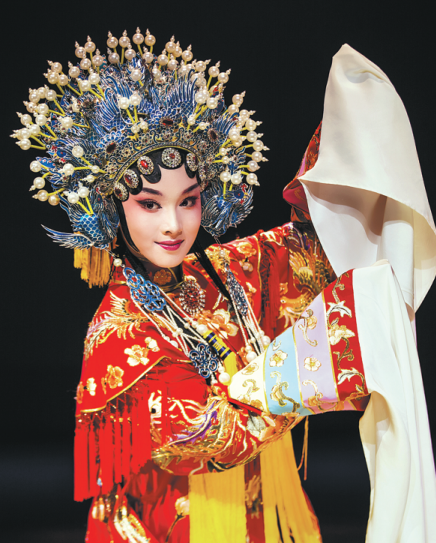Traditional opera enriches local life and culture today

A performer plays Guiju Opera on stage. CHINA DAILY
Guiju Opera, a traditional opera form that originated about 200 years ago in the city of Guilin, Guangxi Zhuang autonomous region, is one of the main local performing art forms that people of all ethnic groups enjoy watching and listening to.
The creation of Guiju Opera scripts can be traced back when Tang Jingsong, a political figure in the Qing Dynasty (1644-1911), wrote the Watching Chess Pavilion Zaju, which became the first group of unique plays in Guiju Opera.
The Guiju Opera is sung in the Guilin dialect, with beautiful tones and melodies. The workmanship of the Guiju Opera is delicate, appropriate and lively. With the help of facial expressions and body postures, it focuses on shaping characters with delicate and life-enriching performances, which is deeply loved by the local people.
Tang, a local in Guanyang county, combined the local operas of northern Guangxi with the Chinese Pihuang Opera. He arranged and wrote the script himself, organized a troupe to perform on stage, and created the world of Guiju Opera.
Since then, the Guiju Opera has integrated the unique customs and humanistic characteristics of Guanyang into its soul, forming a delicate, graceful, vivid, flexible, strong and soft style.
To better inherit and develop Guiju Opera, the Guanyang government has prioritized the training of newcomers to Guiju Opera. The focus is to construct the Guiju Opera Troupe of Guanyang, the only nonprofit professional art group in the county.
In the first half of 2013, the Guanyang Party committee together with local officials decided to reform the original Guanyang County Literature and Art Work Troupe, which was established in 1959. They renamed it the Guanyang County Intangible Cultural Heritage Protection and Inheritance Center.
In May 2014, the center debuted the Guanyang Guiju Opera Troupe. Since then, a new path for the inheritance and development of Guiju Opera in Guanyang has been launched.
In the protection and inheritance of Guanyang's intangible cultural heritage, the center has explored the inheritance of Guanyang Guiju Opera, and paid attention to the in-depth development of Guiju Opera to benefit the people.
More than 4,000 performances of Guiju Opera have been staged at the grass-roots level, benefiting 1 million people.
The center not only studies and learns the performance style of traditional Guiju Opera, but also integrates the stage image of modern song and dance into Guiju Opera, and deepens the guidance work of Guiju Opera among low-income residents.
At the same time, Guanyang also gives special attention to the support of amateur art groups. For example, the Golden Sunflower Amateur Guiju Opera Troupe of Guanyang, which was established in October 2012, currently has acting positions including professional Guiju Opera actors from the old art troupe.
The Guanyang Party committee and the local cultural bureau play an active role in supporting the development of the Gui Opera by providing financial support, purchasing performance costumes and props and equipping them with facilities such as lighting and audio systems.
Yueling village, Wenshi town, is also the birthplace of Guanyang Guiju Opera. The village is located in the northeast of Guanyang, 42 kilometers away from the county seat. It has a history of more than 750 years and has a long tradition of singing and watching Guiju Opera. Today, the village retains three Guiju theaters and a team of more than 30 people.
The head of the group, Tang Zhangren, is 91 years old and still active on the stage.
Zhang Shuping, director of the Guilin Academy of Drama Creation and head of the Guilin Intangible Cultural Heritage Inheritance and Protection Center, said: "Today, I have taken on more social responsibilities. We can do more for the inheritance and development of Guiju Opera and our local culture."
Zhang won the Plum Blossom Award for Lijiang Swallows in his early years.
"I am 55 years old this year. I have worked hard for the drama industry for more than 40 years. I also won the Plum Blossom Award. I feel very happy."
Following the Legend of the Yao Concubine, Zhang performed three major plays in succession such as Brilliant Demeanor, Unexpected Love, and Lijiang Yan, and successively won the Five One Project Award and the Chinese Drama Plum Blossom Award.
"Guiju Opera is like a part of my body and I can't bear to leave it. It is no exaggeration to say that the opera is my love, my heaven, my foundation, and my life," Zhang said.














